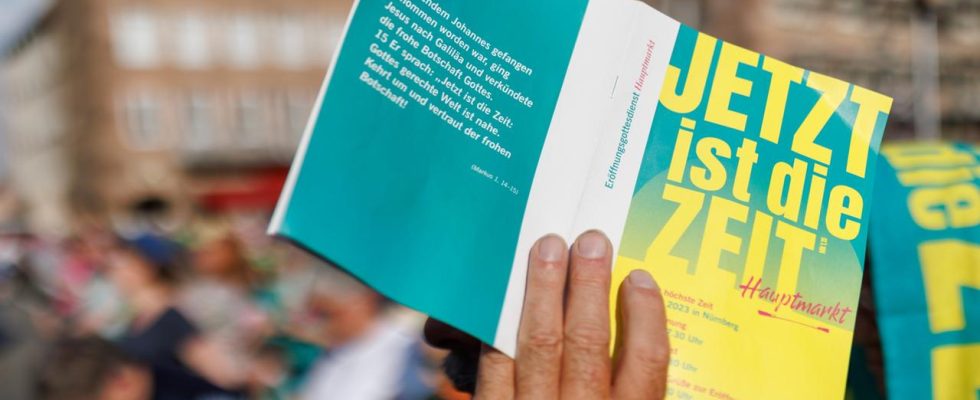The evangelical church is in a dilemma. Between the claim to resolve conflicts without violence and solidarity with Ukraine. This is openly discussed at the Kirchentag in Nuremberg
They still exist: the Christian peace movement. In Hall 1 at the Nuremberg Fair, religion teacher Rainer Schmid from the German Peace Movement promotes pacifism. “The church should no longer follow two tracks, but rely entirely on non-violent methods,” he demands.
“It’s time for guns!”
“Driving on two tracks” – at the opening of the Kirchentag, Federal President Frank-Walter Steinmeier summed up the Christian dilemma: Yes, create peace without weapons. That’s the claim. On the other hand, there is solidarity with Ukraine. “Even I could not have imagined that I would say: In addition to all the other efforts: It’s time for weapons!”
The motto of this Kirchentag, “Now is the time!”, invites you to play on words. Steinmeier’s plea for arms deliveries to the Ukraine met with only isolated opposition from the audience. Rainer Schmid says: “I am disappointed in my church.” She should find a prophetic word, he says, “now is the time for disarmament, for non-military methods.”
Missing the voice of peace movement?
Only: Who should speak this prophetic word? Gerd Bautz from the Martin Niemöller Foundation misses the voice of the peace movement at the Church Congress. For example Margot Käßmann. “The fact that it was canceled is a great loss for the Kirchentag,” says Bautz. “She doesn’t say exactly why. But also because she was frustrated with the peace issue. I would have gone there too, because that’s spirituality and politics rolled into one. That’s the core of the Kirchentag.”
Margot Käßmann used to be the star guest at the Kirchentag. The theologian easily and reliably filled large exhibition halls. Surprisingly, she is not there in Nuremberg. She does not want to talk about the reasons for her rejection. To the Bavarian radio she gave an interview before the Kirchentag. In the ARDDocumentation is about the peace ethics debate in the evangelical church and: why the former chairwoman of the EKD openly and publicly rejects arms deliveries to war zones.
Käßmann says: “I have the impression that a unanimous opinion is being spread all over the country and also in the church, in the top, in the elite. There is no other way. We now have to give billions in weapons to Ukraine “This war has to be won, our values are being defended. That’s a standard that’s going through now, and I experience it differently at the community level as well as in everyday life, and that people then almost lower their voices when they say: I find it all very problematic.”
disagreement weapons shipments
The dispute over military support splits the Protestant Church. The peace commissioner of the EKD, Bishop Friedrich Kramer, has spoken out against arms deliveries since the beginning of the war. He is likely to be in the minority at the top of the church.
Military Bishop Bernhard Felmberg thinks that war and peace must be discussed in a more differentiated manner in the Protestant Church. “We live in a time when democracies are on the decline, and you have to be clear about your own values. And you also have to arm yourself against others challenging those values.”
Today, Felmberg is celebrating a service with soldiers at the Church Day. On the other hand, religion teacher Rainer Schmid wants to demonstrate in front of the church door.

